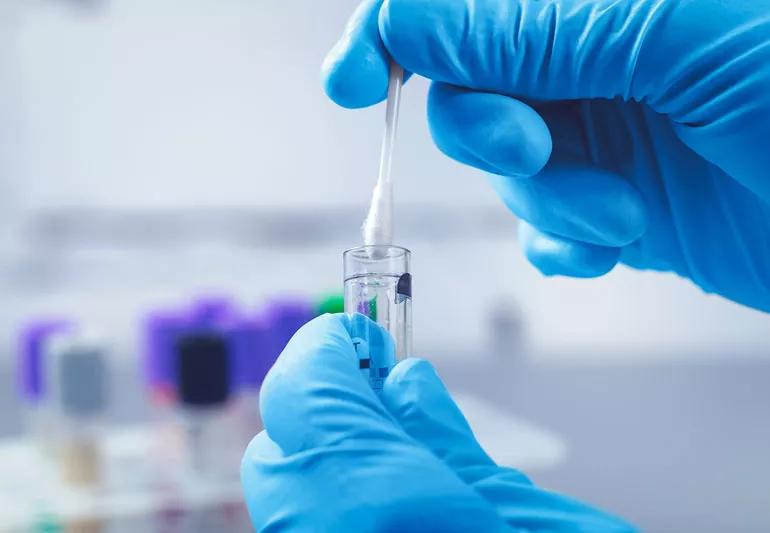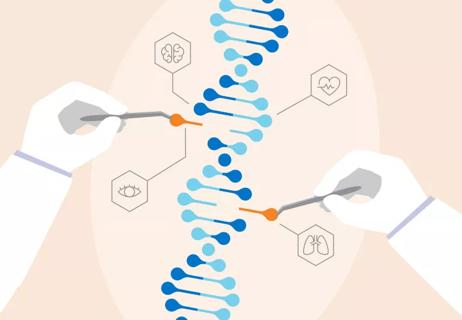Genetic markers can determine if you’ll develop Huntington’s disease or pass it on to your children

Huntington’s disease is a devastating genetic disease passed down from one generation to the next.
Advertisement
Cleveland Clinic is a non-profit academic medical center. Advertising on our site helps support our mission. We do not endorse non-Cleveland Clinic products or services. Policy
Luckily, there’s an accurate genetic test that can determine whether you’ll eventually develop symptoms for Huntington’s disease or, in rare instances, if you’re a carrier and may pass it on to your children. But it’s important to weigh the risks and the rewards before getting tested.
“There’s nothing we can do to prevent it or to delay the onset of Huntington’s right now, so some people don’t want that knowledge hanging over their heads,” says genetics counselor Amy Shealy, MS, CGC.
If you’re under 18, you have to show symptoms of Huntington’s disease before you can get tested. If you’re older than 18 and you’re not sure of your family’s genetic history (or you know family members who’ve had Huntington’s disease), it may be a good idea to consider getting the genetic test if you’re showing symptoms.
“There are some rare look-alike syndromes, so we want to make sure we’re diagnosing and treating the right condition,” says Shealy.
Some early signs of Huntington’s disease include:
Advertisement
If you’re not showing these signs, but you know Huntington’s disease runs in your family, the choice to get tested depends on a variety of personal decisions. Maybe you want to know because you’re thinking of having children and you want to put your mind at ease that you won’t pass on the disease to your kids. Maybe you want to know because it might help with life-planning purposes and making decisions around retirement, end-of-life care and ensuring the success of your surviving family members. Or, maybe it’s the opposite: You don’t want to know because you want to live your life without worry. Regardless of the reason, what you decide to do (or not do) with the knowledge is entirely up to you.
“People will usually think about it for a while on their own, and they should think about why they want the testing,” says Shealy. “It’s a process.”
To get the genetic test for Huntington’s disease, you’ll follow a four-step process that includes three pre-testing appointments.
What does the test look for? The test analyzes a specific genetic sequence found in the huntingtin gene (often called HTT). Everyone inherits two huntingtin genes from their parents: one from mom and one from dad. That specific gene carries instructions for your body to create the huntingtin protein. Although the function of the huntingtin protein isn’t fully known, it’s believed to play an important role in developing nerve cells in the brain.
Inside the huntingtin gene, there’s a sequence of three basic units of DNA — cytosine, adenine and guanine (together called CAG) — that repeats normally 10 to 27 times. Sometimes, the huntingtin gene carries an error in its genetic sequence that causes that CAG to repeat too many times. It’s almost like putting too much salt in cookie batter: Too many CAGs cause the huntingtin protein to be longer than it’s supposed to be. That means it can’t work the way it’s supposed to and it causes damage to the nerve cells in your brain.
Just how many times the CAG repeats is useful information in determining whether someone will develop Huntington’s disease:
Advertisement
Many of the benefits of genetic testing involve being able to rely on knowledge. “I’ve had some people say, ‘I just need to know,’” says Shealy.
If you know you’ll eventually develop Huntington’s disease, you can put plans in place to prepare for when symptoms get worse. And if you discover you won’t have Huntington’s disease, it can be a big psychological relief. “I’ve had some people say, ‘I won’t keep working when I’m eligible to retire because I want to enjoy some time before symptoms start,’” says Shealy.
If you know you have (or will develop) Huntington’s disease, there may be clinical trials or scientific research you can participate in that might benefit you and your symptoms, or honor those you’ve lost and those who might develop it in the future. “A lot of times, people want to do it just to give back,” says Shealy. “It’s altruistic and it’s also a way to be on the cutting edge of anything that can help them.”
If you’re planning on having a baby, there’s pre-implantation genetic testing available as an option for those who go through an in vitro fertilization process. During this process, embryos undergo genetic testing in the lab before they’re implanted. This process can also be done whether you want to know your own diagnosis for Huntington’s disease or not. “Once the pregnancy is conceived, we expect that child to be unaffected,” says Shealy.
Advertisement
There are some downsides to genetic testing, too, some of which may be surprising.
Although Huntington’s disease itself isn’t fatal, the average lifespan for someone who’s diagnosed with Huntington’s disease is another 10 to 30 years after the condition begins because of complications, like the inability to swallow, move and eventual confinement. “Knowing you will develop a near-fatal disease certainly takes some adjustment,” says Shealy. “If your test were to be positive, then there’s a mental health professional that can help you adjust.”
On the flip side, you may find that a negative test for Huntington’s might result in a different kind of psychological stress, especially if you’ve had or lost family members who’ve dealt with the disease. “They feel like they’ve been spared and other family members have not,” says Shealy.
While the Genetic Information Nondiscrimination Act (GINA) is a law put in place in 2008 to protect from health insurance and employment discrimination, Shealy points out that it doesn’t include long-term care life insurance. “Some people don’t want to be tested because they’re worried about their ability to get life insurance or long-term care disability insurance,” says Shealy. “There are some jobs where people may not want to hire somebody who is going to eventually develop symptoms.”
Advertisement
Genetic testing for Huntington’s disease has a 99.9% accuracy rate; however, keep in mind that if you fall in that mid-level range of having 27 to 35 CAG repeats, it’s not known whether or not your children will eventually develop Huntington’s disease. If you’re thinking about genetic testing or you’re on the fence, you can start the process simply by seeking a genetics counselor or neurologist who can help you understand what to expect and answer any questions you may have. “We can certainly see you and walk you through all these pros and cons just to make sure you’ve got the full picture and make the decision that’s right for you,” notes Shealy.
Learn more about our editorial process.
Advertisement

The OR6A2 gene could be behind your dislike of this herb — but with time, your brain may be convinced to like it

This evolving technology may one day eliminate conditions like sickle cell anemia and hemophilia

Why both nature and nurture matter

The short answer from a genetic counselor

Testing can both reveal the likelihood that you’ll pass on complement 3 glomerulopathy and identify possible treatments

Altered genes may cause your heart muscle to thicken

Wearing a scarf, adjusting your outdoor activities and following your asthma treatment plan can help limit breathing problems

Your diet in the weeks, days and hours ahead of your race can power you to the finish line

When someone guilt trips you, they’re using emotionally manipulative behavior to try to get you to act a certain way